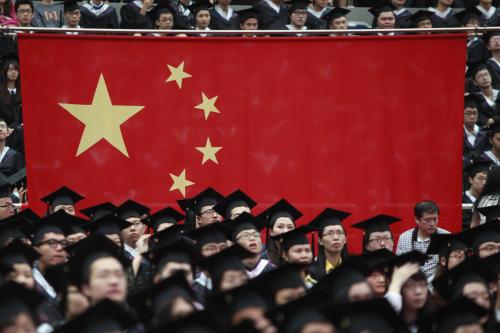Economist Albert Hirschman’s marvelously perceptive little book with big ideas written in 1970 titled “Exit, Voice and Loyalty: Responses to Decline in Firms, Organizations and States” provides a cornucopia of insights into understanding Brexit and the current state of global governance. When it emerged American economist Kenneth Arrow marveled at its extraordinary richness, and political scientist Karl Deutsch, in his presidential address to the American Political Science Association, called it an “outstanding contribution to political theory.”
Economists assume exit to mean dissatisfaction with an organization’s product or the service leading to decline in demand for it. The value of exit lies in the certainty it provides in terms of the relationship between the customer or member and the firm. Political scientists think of how a firm handles its response to customer dissatisfaction as the exercise of voice by stakeholders. The value of voice is that it can lead to reform that ultimately determines the firm’s revival, an idea also advanced by scholar Clayton Christiansen in his book “The Innovator’s Dilemma.” An understanding of the conditions under which exit and voice are exercised requires the incorporation of the concept of loyalty. Loyalty makes voice more probable and exit less likely. But loyalty does not by itself make the exercise of voice more effective. That depends on the extent to which customers or members are willing to trade off the certainty of exit against the uncertainties of improvement in the deteriorating product, and their ability to influence the organization.
Applying these ideas to Brexit suggests that the option of a U.K. exit was made more likely because of the limited voice of the U.K. in achieving reforms, coupled with the fact that Britain’s loyalty to the European Union was mixed at best. Its self-perception as “special people” was accompanied by long-standing skepticism about foreigners, including other Europeans.
Some have attributed Brexit to misjudgment by Prime Minister David Cameron about holding a referendum, poor management of migration policy by the EU including procrastination and downright misjudgment on migration, and they have termed the historic vote as nothing short of the beginning of the end of the post-World War II institutional frameworks, including the Bretton Woods institutions. They fear that the longest and most prosperous period of sustained peace in modern human history, enabled by post-war global architecture, may have come to an end.
The Economist is one proponent of this view, describing Brexit as multiple calamities. The British economy and polity are wildly off the rails, the newspaper notes. The prime minister has resigned with no obvious successor. The leader of the opposition is struggling to survive a coup. The pound hit a 31-year low against the dollar and banks lost a third of their value before stabilizing. Meanwhile there is talk in Scotland and Northern Ireland of secession.
But my own English friends, some of whom favored Brexit, talk about the high tax payments to the EU, oppressive overreach of the EU bureaucracy, and the fear of open borders leading to uncontrollable immigration from Eastern Europe, Turkey, and the Middle East. In short they see EU membership as all pain and no gain. On the surface Brexit has all the flavors ranging from nostalgia of self-rule to xenophobia.
Lessons for global governance?
There are already signs that exit is becoming the preferred option in various global governance organizations. Global loyalties are split, not just among great powers, but also between developed and developing countries. Voice and reform have not been effective.
Hirschman mentions leadership and timely action in sharing power with the next generation as a behavioral trait (often found in the animal kingdom) favoring voice. He contrasts that with exit, which he describes as a human behavior which assumes markets, including political markets, will solve problems.
Hirschman’s chapter “Exit and Voice in American Ideology and Practice” helps us to better understand the U.S. role in global governance. He notes that exit has been accorded “an extraordinarily privileged position in the American tradition” founded in its very creation as a land of immigrants, who, he reminds us, were opting for exit. Indeed, like in Britain, “the neatness of exit over the messiness and heartbreak of voice” has persisted throughout U.S. history. In his last chapter, “Elusive Optimal Mix of Exit and Voice,” he does not come up with a recipe for some optimum mix of the two, nor does he recommend each institution has its own optimum mix, instead arguing conditions are seldom ripe for their optimum and stable mix—although it is possible to say there is deficiency of one or the other at a given point in time.
Today, it seems that the dominant mode of the post-World War II era, namely voice, is plainly revealing its inadequacy, so the other mode, exit, will eventually be injected once again.
Having had a leading role in founding the global architecture of the United Nation, Food and Agriculture Organization, and Bretton Woods institutions, the U.S. has had a strong voice in and loyalty to the Bretton Woods institutions as well as leadership roles commensurate with its historic roles. U.S. loyalty to the U.N. outside of the Security Council has varied among administrations, since voice in U.N. organizations is distributed more equally. The U.S. has opted for exit from specific U.N. organizations from time to time when it has disliked the dissenting views of other members.
Others are also choosing to exit. China’s slightly increased shares in the International Monetary Fund and the World Bank after the financial crisis are nowhere near its weight in the global economy, thanks to European reluctance to accept a reduced voice. China and other emerging countries have exercised a partial exit option by establishing the Asian Infrastructure Investment Bank and the New Development Bank to meet the investment needs of developing countries.The U.S. considered the establishment of the two as a threat to its leadership and to the Bretton Woods institutions, viewing the acts as verging on disloyalty, whereas most U.S. allies have embraced membership in both. And yet the Asian Infrastructure Investment Bank is following on the footsteps of the Bretton Woods institutions as regards norms and rules.
To strengthen global governance requires strengthening “voice” and weakening incentives for “exit” from the U.N. and Bretton Woods institutions and other forums of global governance. The U.S. needs to also lead the effort to increase the rewards and reduce the cost of exercising voice. This would be a timely reminder, when politics seems to thrive on divisions, that leadership means forging inclusive institutions that serve all members.



Commentary
Exit, voice, and loyalty: Lessons from Brexit for global governance
July 7, 2016